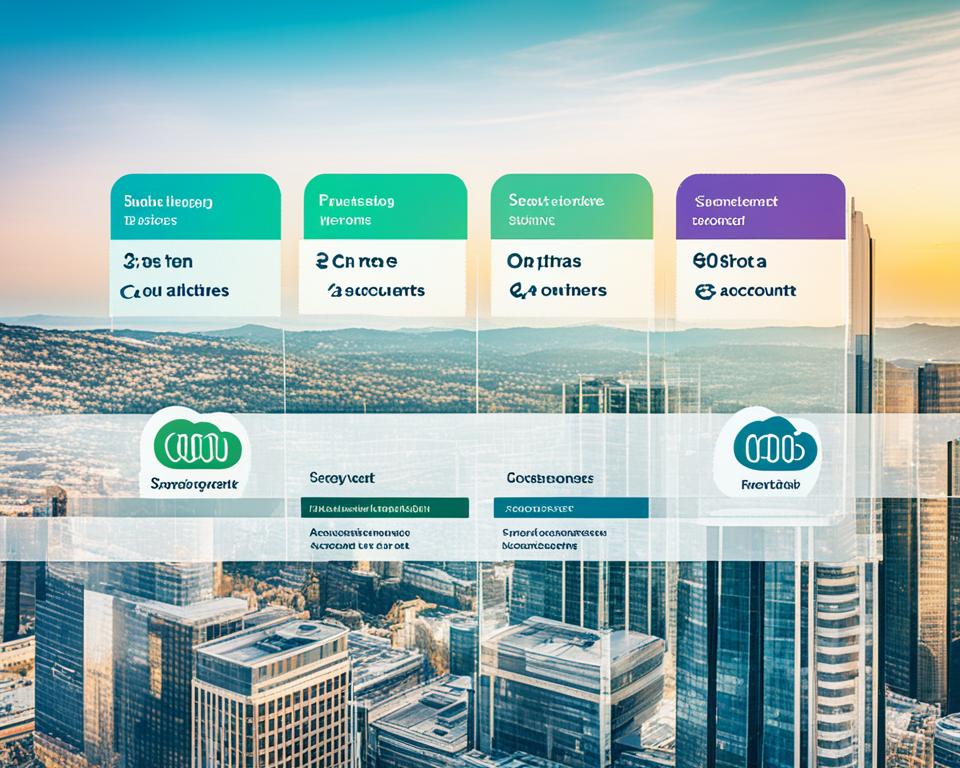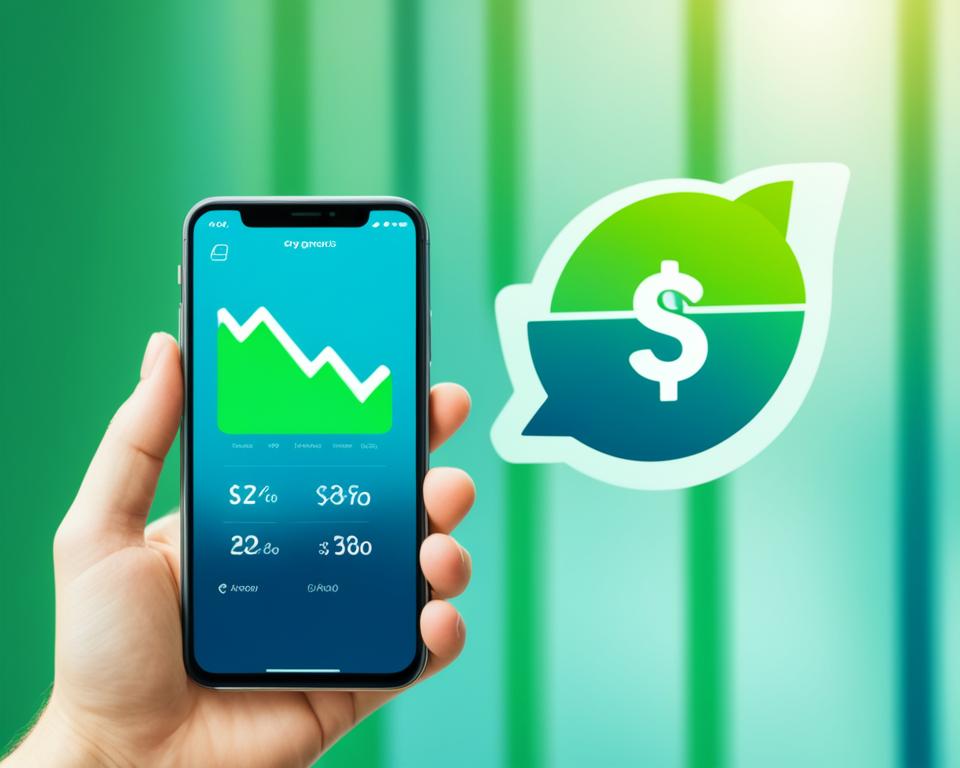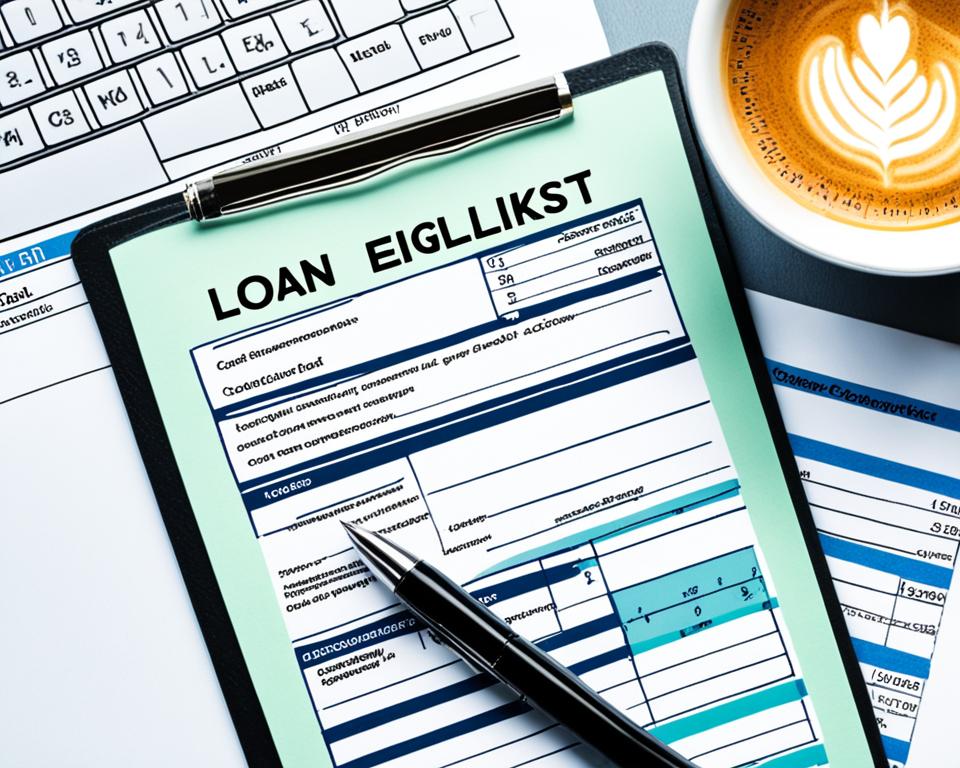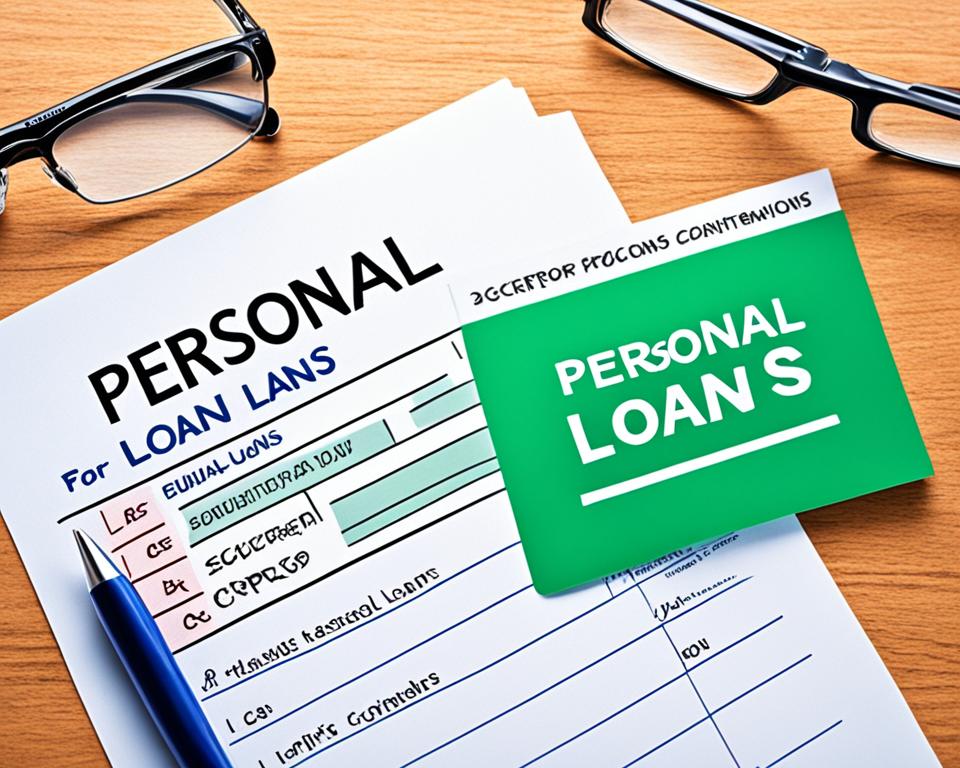Opening a savings account online has never been easier. With just a few simple steps, you can open a bank account without ever leaving the comfort of your home. Whether you’re looking to start saving for a goal, building an emergency fund, or simply wanting to take advantage of higher interest rates, opening an online savings account is a convenient and secure option.
Online banks and credit unions offer a range of benefits compared to traditional brick-and-mortar institutions. Not only do they provide higher interest rates on your savings, but they also generally have lower fees. Plus, these online banks are insured by the Federal Deposit Insurance Corporation (FDIC) or the National Credit Union Administration (NCUA), ensuring that your money is protected.
Key Takeaways:
- Opening a savings account online is fast and convenient.
- Online banks and credit unions offer higher interest rates and lower fees.
- FDIC or NCUA insure online bank accounts.
- Consider your savings goals and compare different account options.
- Ensure you have the required documents before applying.
Choose the Right Account
When it comes to banking, it’s essential to choose the right account that suits your financial needs. Whether you’re looking for a checking account for everyday transactions or a savings account to build your wealth, understanding your options is crucial. Before opening an account, consider the type of account you want, such as checking or savings.
Checking Accounts:
A checking account is ideal for managing your day-to-day transactions, including paying bills, making purchases, and accessing funds conveniently. Some key features to look for in a checking account include low or no monthly fees, access to a wide ATM network, and online banking tools for easy money management.
Savings Accounts:
Savings accounts are designed to help you save and grow your money over time. These accounts typically offer higher interest rates than checking accounts, allowing your savings to compound. Look for savings accounts that have no or low minimum balance requirements, competitive interest rates, and convenient mobile or online banking options.
Having multiple accounts can also be advantageous depending on your financial goals. It allows you to separate your funds for different purposes, such as emergency savings, vacation savings, or long-term investments.
If you’re considering opening an account with someone else, such as a spouse or family member, a joint account may be the right choice. Joint accounts provide shared access and joint responsibility for managing finances.
Before finalizing your decision, always check that the account is FDIC insured for banks or NCUA insured for credit unions. This insurance ensures that your funds are protected, up to certain limits, in case the bank or credit union fails.
Comparison Table: Checking vs. Savings Accounts
| Checking Account | Savings Account | |
|---|---|---|
| Key Features | – Low or no monthly fees – Access to a wide ATM network – Online banking tools |
– Competitive interest rates – No or low minimum balance requirements – Convenient mobile or online banking options |
| Primary Use | Managing day-to-day transactions | Building savings and earning higher interest |
| Additional Benefits | – Overdraft protection – Debit card usage – Easy fund transfers |
– Automatic transfers for saving – Goal-setting features – FDIC or NCUA insured |
Choosing the right account is the first step towards efficient money management. Consider your financial goals, spending habits, and desired features when selecting a checking or savings account that aligns with your needs. Always prioritize the safety of your funds by ensuring the account is FDIC or NCUA insured.
Gather Required Documents
To open a bank account online, you will need to gather a few essential documents and pieces of information. Here is a checklist of what you’ll need:
- Personal Documents: Make sure you have a valid government-issued ID, such as a driver’s license or passport. This will verify your identity and ensure compliance with banking regulations.
- Initial Deposit: Some banks may require an initial deposit to open an account. Check the bank’s requirements to determine the minimum deposit amount.
- Routing and Account Numbers: If you want to link your new account to another bank account, you may need to provide the routing and account numbers for that account. This allows for easy transfer of funds between accounts.
- Debit Card Information: If you already have a debit card linked to another bank account, you may need to provide that card’s information if you wish to link it to your new account.
- Additional Documents for Joint Account Owners: If you plan to open a joint account with another person, such as a spouse or family member, you may need to provide additional documents, such as their government-issued ID and Social Security number.
By having all the necessary documents and information ready, you can ensure a smooth and efficient account opening process. Keep these items within reach as you proceed with the online application.
“Preparing the required documents in advance will save you time and frustration during the account opening process. Be sure to gather everything you need to simplify and expedite the application.”
| Required Documents | Description |
|---|---|
| Personal Documents | A valid government-issued ID, such as a driver’s license or passport. |
| Initial Deposit | The minimum deposit required to open the account. |
| Routing and Account Numbers | If you want to link your new account to another bank account, you will need the routing and account numbers for that account. |
| Debit Card Information | If you wish to link a debit card from another bank account, you will need to provide its information. |
| Additional Documents for Joint Account Owners | If opening a joint account, additional documents may be required for the joint account owners. |
Fill Out the Application
Once you have selected the right bank and account for your needs, the next step is to fill out the online application. This process requires you to provide accurate personal details and information to complete your application successfully.
Here are the essential details you will need to provide:
- Personal Details: Fill in your full legal name, date of birth, and social security number. It is crucial to ensure that the information you provide matches your official identification documents.
- Contact Information: Enter your current residential address, phone number, and email address. This will allow the bank to communicate with you regarding your account.
Rest assured that banks prioritize the security of your personal information. All data is encrypted and protected to ensure your privacy.
It is also worth noting that some banks may require additional documents or steps to verify your identity. This could include providing scanned copies of your ID or having to visit a branch physically.
Pro Tip: Before beginning the application, gather all the necessary documents and information to streamline the process. This will help you complete the application accurately and save you time.
Once you’ve filled out the application and submitted it, the bank will process your information and review your application. This may take some time, but many banks offer instant approval for online applications.
Now that you understand the process, let’s dive into some notable online banking options and compare their features.
Explore Different Account Options
When it comes to choosing an online account, there are several options available for you to consider. Each account comes with its own features, benefits, and terms. Take a look at some of the popular account options:
| Account | Annual Percentage Yield (APY) | Minimum Balance Requirement |
|---|---|---|
| SoFi Checking and Savings | 2.25% | No minimum balance |
| CIT Bank Platinum Savings | 1.85% | $25,000 |
| BMO Alto Online Savings Account | 1.70% | $0 |
| Wealthfront Cash Account | 1.27% | $1 |
| Betterment Cash Reserve | 0.30% | No minimum balance |
| Marcus by Goldman Sachs High-Yield CD | 0.60% | $500 |
| Barclays Online CD | 0.35% | $1,000 |
| Discover CD | 0.55% | $2,500 |
Compare the Annual Percentage Yield (APY) offered by these accounts, as well as their minimum balance requirements. It’s important to choose an account that aligns with your financial goals and preferences.
Consider the benefits and features of each account option. Some accounts may offer additional perks like ATM fee reimbursements, mobile banking apps, or 24/7 customer support. Take your time to explore and find the account that suits your needs best.
With a diverse range of online account options available, you can find the perfect fit for your financial needs. Whether you’re looking for a checking and savings account combo like SoFi Checking and Savings, a high-yield savings account like CIT Bank Platinum Savings, or a certificate of deposit like Marcus by Goldman Sachs High-Yield CD, there’s something for everyone. Take the time to compare the features and benefits of each account to make an informed decision.
Checking Account Options
If you need a checking account for day-to-day transactions, consider options like SoFi Checking and Savings, Capital One 360 Checking, Discover Cashback Debit, and Chime Checking Account. These accounts offer convenience, flexibility, and various features to meet your banking needs.
When comparing these checking accounts, it’s essential to consider their APY and monthly fees. Let’s take a closer look at each option:
-
SoFi Checking and Savings:
- Competitive APY
- No monthly fees
- No overdraft fees
- Free ATM access
-
Capital One 360 Checking:
- No monthly fees
- No minimum balance requirements
- Mobile banking and e-check deposit
- Free overdraft protection
-
Discover Cashback Debit:
- Earn cashback on debit card purchases
- No monthly fees
- No minimum deposit
- Free online and mobile banking
-
Chime Checking Account:
- No monthly fees
- No minimum balance requirements
- Early direct deposit
- No overdraft fees
By comparing these options, you can find the checking account that best suits your needs. Whether it’s the competitive APY of SoFi Checking and Savings, the convenience of Capital One 360 Checking, the cashback rewards of Discover Cashback Debit, or the features of Chime Checking Account, each account has its own advantages.
Take the time to consider your banking preferences and find the checking account that aligns with your financial goals.

Money Market Accounts
Money market accounts are a great option for individuals looking to maximize their savings while still having access to some checking account features. Two popular money market account options to consider are the UFB Secure Money Market and Discover Money Market Account.
These accounts offer higher interest rates compared to traditional savings accounts, allowing your money to grow faster. Additionally, they provide the convenience of check writing and debit card access, making it easy to access your funds when needed.
When comparing UFB Secure Money Market and Discover Money Market Account, there are a few factors to consider:
- Annual Percentage Yield (APY): The APY determines the amount of interest you will earn on your money. Look for an account with a competitive APY to maximize your savings.
- Minimum Balance Requirements: Some money market accounts have minimum balance requirements to open the account and avoid fees. Compare the minimum balance requirements of UFB Secure Money Market and Discover Money Market Account to ensure they align with your financial goals.
By carefully evaluating these factors, you can choose the money market account that best suits your needs and helps you achieve your savings goals.
Comparison of UFB Secure Money Market and Discover Money Market Account
| Account Features | UFB Secure Money Market | Discover Money Market Account |
|---|---|---|
| Annual Percentage Yield (APY) | 1.50% | 1.25% |
| Minimum Balance Requirements | $2,500 | $2,500 |
| Check Writing | Yes | Yes |
| Debit Card Access | Yes | Yes |
| FDIC Insurance | Yes | Yes |
Both UFB Secure Money Market and Discover Money Market Account offer competitive APYs and require a minimum balance of $2,500 to open the account. With check writing and debit card access, you can easily access your funds while still earning interest. Additionally, both accounts are FDIC insured, providing peace of mind knowing that your deposits are protected up to $250,000 per depositor.
Whether you choose UFB Secure Money Market or Discover Money Market Account, it’s important to regularly review your account to ensure it continues to meet your financial needs and goals.
Certificates of Deposit (CDs)
Certificates of Deposit (CDs) are a popular financial instrument that offer higher interest rates compared to traditional savings accounts. With CDs, you can earn a fixed rate over a specified term, making them an attractive option for individuals looking to grow their savings over time.
If you’re considering opening a CD, there are several reputable banks that offer competitive rates. These include:
- Marcus by Goldman Sachs High-Yield CD
- Barclays Online CD
- Discover CD
Each of these banks provides customers with a secure and reliable platform to invest their funds. Here’s a closer look at what they offer:
| CD Provider | APY | Term | Minimum Opening Deposit |
|---|---|---|---|
| Marcus by Goldman Sachs High-Yield CD | 2.25% | 12 months | $500 |
| Barclays Online CD | 2.30% | 24 months | $1,000 |
| Discover CD | 2.10% | 36 months | $2,500 |
As you can see, each bank offers different APYs, terms, and minimum opening deposits. It’s essential to consider your financial goals and the length of time you’re comfortable locking your funds away before choosing the right CD for you.
CDs are a conservative investment choice, especially for those who don’t want to expose their savings to market fluctuations. They provide stability and the opportunity to earn a higher return on your investment compared to other low-risk options.
Keep in mind that early withdrawal penalties may apply if you need to access your funds before the CD’s maturity date. Make sure to consider your financial needs and any potential liquidity requirements before opening a CD.
Remember to do your research, compare rates, and consider your financial goals before making a decision. CDs can be an excellent addition to your overall savings strategy, helping you achieve your long-term financial objectives.
Benefits of Savings Accounts
If you’re looking for a secure and convenient way to grow your money, a savings account is an excellent choice. Here are some of the benefits that come with opening a savings account:
- Easy fee waivers: Many savings accounts offer easy fee waivers, ensuring you can save your hard-earned money without worrying about monthly charges or maintenance fees.
- Mobile and online banking: With a savings account, you can take advantage of mobile and online banking services, allowing you to manage your finances anytime, anywhere.
- E-statements: Instead of receiving paper statements in the mail, savings accounts often provide e-statements, which are not only eco-friendly but also convenient to access and organize.
- Extensive ATM network: Most savings accounts grant you access to an extensive ATM network, ensuring you can easily withdraw cash or deposit money whenever needed.
Additionally, savings accounts are protected by the Federal Deposit Insurance Corporation (FDIC), offering peace of mind with up to $250,000 in FDIC protection per depositor. This means that even in the event of bank failure, your money is safe and secure.
Take advantage of all these benefits and start building your savings today with a reliable and reputable bank.
Conclusion
Opening a savings account online is the convenient and secure way to manage your finances. With hassle-free banking, you can easily set up your account from the comfort of your own home.
Online banking services offer a range of benefits, including 24/7 access to your account, seamless fund transfers, and the ability to view and manage your transactions online. You can also enjoy the convenience of e-statements and easily track your savings progress.
By choosing to open a savings account online, you not only save time and effort, but also ensure the security of your funds. Banks employ robust security measures to protect your personal and financial information, giving you peace of mind.
Don’t miss out on the advantages of hassle-free banking. Open a savings account online today and experience the convenience and flexibility it offers for managing your money.
FAQ
How can I open a savings account online?
To open a savings account online, you need to find a bank or credit union that offers online account opening services. Visit their website and follow the instructions to open an account. Make sure to have all necessary documents and personal information ready.
What type of account should I choose?
The type of account you should choose depends on your financial goals. If you need a checking account for day-to-day transactions, opt for a checking account. If you want to save money and earn interest, choose a savings account. Consider your needs and compare the features and benefits of different accounts.
What documents do I need to open an account online?
To open an account online, you will typically need a valid government-issued ID, such as a driver’s license or passport. You may also need to provide additional documents, such as proof of address or employment. In some cases, you may need to provide your debit card information or the routing and account numbers of another bank account you own.
How do I fill out the online application?
When filling out the online application, provide accurate personal information, including your full name, Social Security number, date of birth, address, and contact information. Follow the prompts and provide any required documents or information as requested. Make sure to double-check your application before submitting it.
What are some online account options to consider?
There are several online account options to consider, such as SoFi Checking and Savings, CIT Bank Platinum Savings, BMO Alto Online Savings Account, Wealthfront Cash Account, Betterment Cash Reserve, Marcus by Goldman Sachs High-Yield CD, Barclays Online CD, and Discover CD. Compare their features, such as APY, minimum balance requirements, and terms, to find the one that suits your needs.
What are some options for checking accounts?
If you need a checking account for day-to-day transactions, you can consider options like SoFi Checking and Savings, Capital One 360 Checking, Discover Cashback Debit, and Chime Checking Account. Compare their features, such as APY and monthly fees, to choose the one that best fits your financial needs.
What are money market accounts?
Money market accounts are a type of savings account that offer higher interest rates and some checking features. Some options to consider are UFB Secure Money Market and Discover Money Market Account. Compare their features, such as APY and minimum balance requirements, to make an informed decision.
What are certificates of deposit (CDs)?
Certificates of Deposit (CDs) are time deposits that offer higher interest rates with a fixed rate and term. Options like Marcus by Goldman Sachs High-Yield CD, Barclays Online CD, and Discover CD provide competitive APYs. Consider their term and minimum opening deposit when choosing a CD.
What are the benefits of savings accounts?
Savings accounts offer various benefits, including easy fee waivers, convenient mobile and online banking, access to e-statements, access to an extensive ATM network, and FDIC protection up to 0,000 per depositor. These accounts provide a secure and hassle-free way to save and manage your money.
Why should I open a savings account online?
Opening a savings account online is a quick and secure way to establish a banking relationship without visiting a branch. It offers convenient features such as online banking services, mobile banking, and e-statements. You can take advantage of higher interest rates, lower fees, and the peace of mind that comes with FDIC or NCUA insurance.





